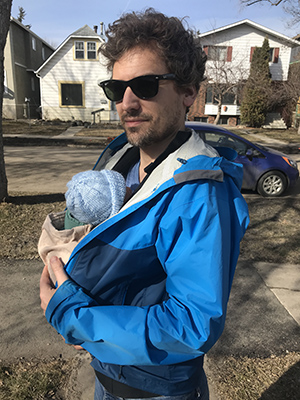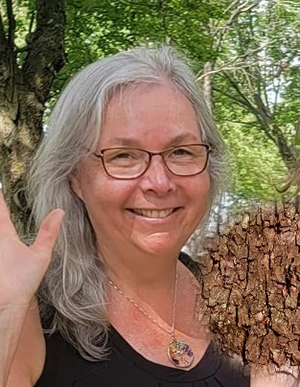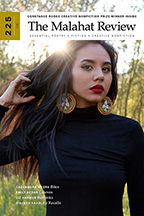Face the Strange: Sylvie Paquette in Conversation with Ben Lof

Malahat Review volunteer Sylvie Paquette talks with Ben Lof, winner of the 2021 Far Horizons Award for Short Fiction with his story, "Naked States."
Read an excerpt of "Naked States" here.
Ben Lof's fiction has appeared in The Journey Prize Stories and various literary magazines. He won the Howard O'Hagan Award for Fiction, and was a finalist for the Bronwen Wallace Award and a Western Magazine Award. He has an MA in English/Creative Writing from the University of Alberta and he attended the Writing Studio at the Banff Centre for the Arts. Ben lives with his partner and two young children in Edmonton on Treaty Six Territory.
Read what judge Francine Cunningham had to say about his winning story.
Is this story based on personal experience or a wish to liberate yourself from worldly attachments? Were you surprised with the outcome of the story and if so, how?
Well, I do have experience trying to live and communicate with people, and getting it all wrong at times. But I’ve never gone on a year-long purge of comforts and various behaviours!
I like questioning habits and daily routines though, to see if they affect my brain's ability to focus or have a positive outlook on life. And sometimes you’re forced to change. I run a few times a week to clear my mind, but I once wrecked my knee and could barely walk let alone jog for some time. I had to find calmness elsewhere. I think I’d forgotten that other avenues are even possible. I’m grateful for that period now, though it began in a very low place. Changing habits or routines can show you that disruption is a good thing.
I did worry briefly that the story was becoming a one-dimensional satire on self-liberation. Ultimately I realized that, if it’s an element in the story, it's there as a conceit or vehicle for April and Frank's journeys. The thing you're giving up isn't necessarily the point, it's the vehicle for your curiosity, for your desire to disrupt. Frank and April become curious. And to paraphrase a psychologist I once heard on the radio talking about changing behaviours: It's the curiosity that matters.
Of course, the pandemic has forced people to give up all kinds of things, sometimes the ability to connect with other people, and that may have put me in the headspace which allowed this story to tell itself. A friend told me early on: This pandemic is laying bare a lot of stuff that was previously hidden. He was right. It’s exposed rawer emotional elements in our relationships, in our daily lives, within ourselves. That can be painful, but it can also allow us to go back and see things in new ways, to live by the light of a candle again, if we're lucky.
I was surprised that the story finished as quickly as it did, though the calendar structure was clear from the start. I thought it might spill into another year. I also didn't know it would wrap up in April's POV, as she seems to be changing on the inside while perhaps Frank changes more evidently on the “outside.”
How did you come up with the title and did you come up with several options before deciding on this one?
“Naked States” was one of many titles I went through, and it comes from a line in the story. It also refers to the characters getting “pared down to bare,” as April feels near the end.
But my main working title was “Ch-ch-changes” which was inspired by the chorus of the David Bowie song, “Changes.” There's a line in the chorus, “Turn and face the strange,” and I think that's what the characters are doing by the end of the story. Certainly that’s what April is doing, facing the strange. Sometimes you need to get away from the noise of your own existence so you can start to observe things, so that you can listen and actually hear things on their own terms, in all their strangeness. And I think good writing often does get at that strangeness all around us, in our interactions, our sensory worlds, our language.
How long did it take to write the story? What was the editing process like?
The first draft took about an hour in the middle of the night. A year ago I was in my partner’s family cabin, totally alone for 24 hours. As a newish parent this scenario is a rarity, a gift. I was there to work on a different piece, and it wasn't coming off. So I procrastinated by making myself comfortable in the space, getting overly set up, making a fire, making more coffee. I attempted to chop wood with an axe. I got frustrated wasting my precious alone time.
That night I woke around 3 a.m. with a few lines in a certain voice and rhythm, nothing to do with the piece I'd been working on. Did I dream them? I didn't have my notebook close by, but sure enough there was my phone, so I dictated the lines into the recorder app, and more kept coming. The entire first draft went into the phone over the next hour. I transcribed it all into my notebook in the morning, which was excruciating, listening to my sleepy voice say a line and then silence for 20-30 seconds, and then another line and so on. And that was the foundation. The first sections of the story are nearly verbatim to the sleep-talking on that audio file.
I actually thought this was a throwaway story, but over many months I would wonder about it and return for more edits, usually at night in the attic after the kids were asleep. The revisions were more fun than usual for me, maybe because the story is so much shorter than I'm used to, and the pacing and voice were a pleasure to work with at times. At the end of these nighttime edits, I'd put “Changes” on my headphones as a reward—it would get me pumped up. I feel like that song, especially the intro, how it builds and releases after he says, “Oh yeah,” has such great energy, and it became a kind of ghost behind the story over the course the editing process.
Whose writing inspired you the most as a child that made you choose to become a writer, and whose work do you enjoy reading now?
I remember as a church kid reading bible stories, also fairy tales, and choose-your-own-adventure books whenever I was home sick for some reason. Perhaps those shaped my approach to narrative in ways I can’t see. I really got interested in fiction in high school, thanks to one teacher introducing us to Ivan Ilyich and Gregor Samsa. But it wasn’t until university that I knew I wanted to write seriously. I began to love short fiction. I was and still am so taken with the emotional depth and complex, full worlds and voices in Gallant, Munro, and Chekhov.
There are so many other incredible writers who influenced me, but the short stories of Lisa Moore and Greg Hollingshead were probably my other biggest guides. Hollingshead’s brilliant Act Normal has to be one of the most underrated Canadian books of the last decade. Lately, I've really been enjoying Lauren Groff, George Saunders, André Alexis, and Souvankham Thammavongsa.
With two infants at home, we are often reading children’s books more than anything. And it’s inspiring to watch them delight in the reading experience. Our two-year-old loves Grace Lin, Keiko Kasza, Richard Van Camp, Jon Klassen, and anything illustrated by Julie Flett. My brother and sister-in-law just mailed us her most recent book, bought from the Indigenous-owned Massy Books in Vancouver.
What is your writing discipline like, and how long did it take for you to develop it?
My writing routine has been a bit shredded by my parenting routine, so I’m hopefully becoming more adaptive to writing anywhere and anytime, and being more efficient with time. Maybe it’s a good disruption. I’m just grateful to have childcare whenever we can get it! But ideally, I like to write new material in the morning, always longhand, and edit other things later on in the morning or afternoon. And I try to practice gratitude when I remember. I get to listen to people, listen to nature, and witness beauty every day, if I’m alive to it. I get the opportunity to develop a voice and craft a story, to share something.
Things I’m always relearning about the process are probably obvious to most. They include getting that first draft down on the page when it is speaking to you, for if you leave it too long the voice can become stale or lose its urgency, and then you are lost again.
Also, the brain needs oxygen, and for the writing brain that oxygen is reading. If it feels like you don’t have time to both write and read on a given day or week, you sometimes need to find or make or invent time to read, even at the expense of more writing time. The writing will come, and will be stronger for it.
Can you talk about any writing projects you are currently working on?
I’m just starting my second story collection, which will be linked stories about characters in the Alberta Legislature Building during the NDP government of 2015-19. I worked various communications jobs in the Legislature then, and have a lot of voices and story ideas stemming from that wild and historic time, and from that creaking old building which will be a character itself. The book will be about political staffers, reporters, maintenance and cafeteria workers, protestors, and marginalized Albertans all trying to make sense of life, with modern-day Alberta as the backdrop. I hope the stories will also show a different side of the province, one that will question the official narratives we tell ourselves or present to the rest of the country and world.

Sylvie Paquette
* * * * * * * *









